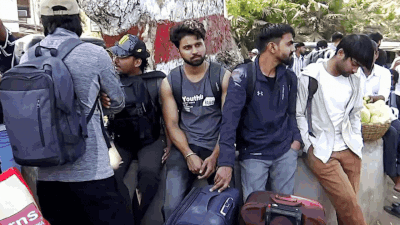Suicide, protests, evictions and arrests: How a Nepali student’s death sparked chaos at Odisha’s KIIT | Bhubaneswar News

NEW DELHI: The death of a 20-year-old Nepalese BTech student at Kalinga Institute of Industrial Technology (KIIT) in Odisha has triggered widespread protests, diplomatic intervention and high-level investigations. The student, who allegedly died by suicide in her hostel room, had reportedly faced continuous harassment on campus. The incident sparked outrage among Nepalese students, leading to demonstrations and claims of forced eviction, which escalated into a diplomatic matter between India and Nepal.
The incident and arrest
On Sunday evening, the third-year student was found dead in her hostel room. Following an investigation, the police arrested a 21-year-old student from Lucknow, Uttar Pradesh, on charges of persistent harassment, which allegedly drove the young woman to take her own life. Her cousin, in a complaint at Bhubaneswar’s Infocity police station, claimed that several complaints against the accused had gone unheard by the authorities.
Nepal’s PM raises concern
Nepal Prime Minister K P Sharma Oli addressing the matter through social media expressed concerns over the alleged “forced eviction” of Nepalese students from KIIT and urged the Indian government to intervene.
“It has come to our attention through media and social media that a Nepali student has died in the hostel…and that Nepali students have been forcibly evicted from the hostel. The government is working on this matter through diplomatic channels and is in contact with the relevant authorities,” Oli wrote on Facebook.
Later, he took to X (formerly Twitter) to state that Nepal’s embassy in New Delhi had dispatched officers to Bhubaneswar to support the affected students. The embassy ensured that the students could either stay in their hostel or return home, depending on their preference.
Student protests and campus Evictions
Following the student’s death, Nepalese students staged protests, accusing the university of ignoring complaints of harassment. Tensions escalated when videos of campus guards clashing with students surfaced online. Soon after, KIIT authorities announced the immediate closure of the university for all international students from Nepal and directed them to vacate the premises.
Reports emerged of Nepalese students being dropped off at Cuttack railway station without proper travel arrangements. A student told PTI, “We were told to vacate our hostel rooms and dropped at the railway station. We have an exam scheduled for February 28.”
Odisha govt steps in
Odisha’s higher education minister, Suryabanshi Suraj, stated that chief minister Mohan Charan Majhi had instructed officials to handle the issue with “utmost seriousness,” given India’s strong ties with Nepal.
“KIIT should not have evicted the Nepali students,” the minister emphasized.
Following diplomatic intervention, the Odisha government ordered KIIT to allow Nepalese students back on campus. In a statement, the university urged affected students to return, assuring them of a safe environment for academic activities.
Nepal’s warning and diplomatic actions
On Tuesday, Nepal’s Ministry of Education, Science, and Technology warned that it might stop issuing no objection certificates (NOCs) for students wishing to study in Odisha if the situation was not resolved fairly.
Meanwhile, Nepal’s Foreign Ministry expressed deep sorrow over the student’s death and pledged continued efforts through diplomatic channels. The ministry also thanked the Indian government and Odisha authorities for their cooperation in addressing the issue.
Crackdown on KIIT authorities
As outrage over the handling of the situation grew, Odisha authorities took action against KIIT personnel. The state government formed a three-member committee, headed by Additional Chief Secretary Satyabrata Sahu, to investigate the matter.
On Tuesday, police arrested three high-ranking KIIT officials and two private security guards for allegedly mistreating Nepalese students. KIIT later suspended three officers and dismissed the two arrested security guards, issuing a public apology.
“We are extremely appalled by the untoward incident that took place on our campus. We deeply regret the way some of our staff behaved with the agitating students. We love our students and have never done any disservice to them,” a KIIT statement read.
Political repercussions and demands for justice
The incident sparked heated discussions in the Odisha Assembly. BJD MLA Pratap Keshari Deb criticized the government’s handling of the situation, while Congress MLA Tara Prasad Bahinipati called for a judicial probe. BJP MLA Babu Singh went a step further, demanding the arrest of KIIT founder Achyuta Samanta.
Outside the assembly, BJD MLA Goutam Buddha Das blamed the government for failing to manage the crisis, stating, “The government’s inaction allowed the situation to escalate, tarnishing Odisha’s reputation internationally.”
Odisha government’s assurance
The Odisha government reaffirmed its commitment to justice, pledging swift and fair legal proceedings. Commissioner of Police S Dev Datta Singh assured students of their safety and encouraged them to reach out in case of any difficulties.
“We are committed to ensuring the safety and security of all students, including those from Nepal. In case of any difficulty, the students can approach us 24×7 on 8280338301,” Singh said.
With diplomatic negotiations underway and a high-level inquiry in progress, all eyes remain on how KIIT and Odisha authorities will navigate the crisis and restore normalcy on campus.
















